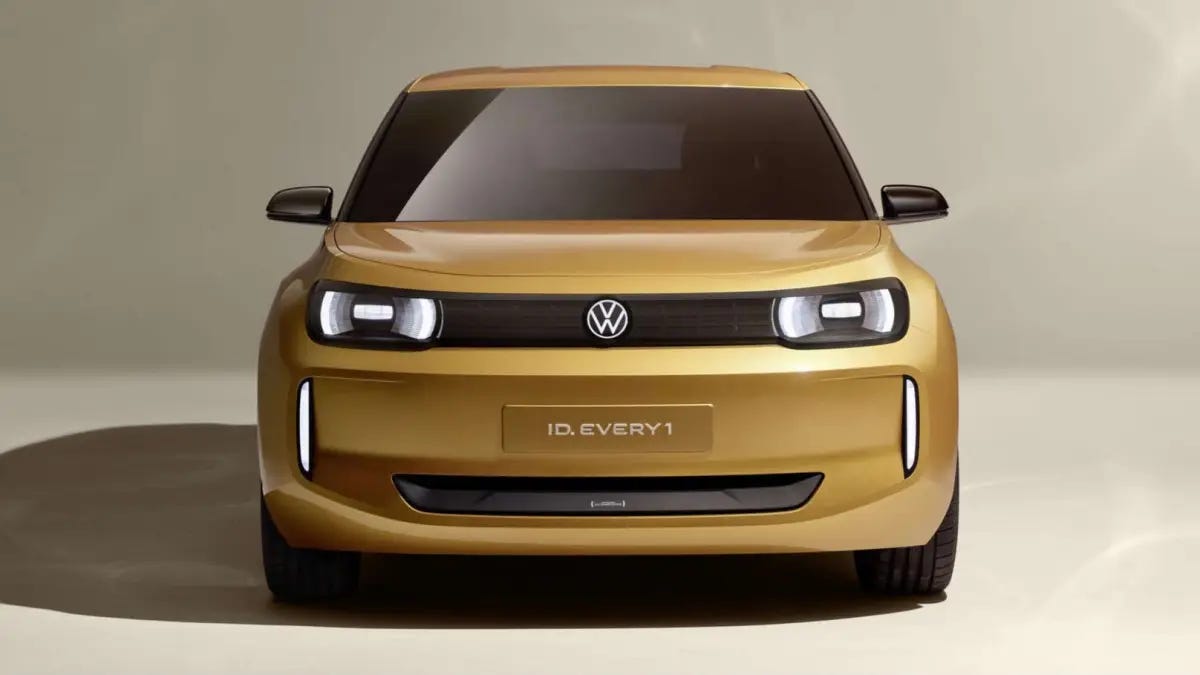Autoeuropa to produce Volkswagen’s most affordable electric car
Scheduled for launch in 2027, this “made in Portugal” electric city car aims to democratize electric mobility in Europe, with an estimated price tag below €20,000.
In a significant development for Portugal’s economy and automotive industry, Volkswagen Autoeuropa, located in Palmela, has been chosen by the Volkswagen Group to produce the future ID.1, the German automaker’s most affordable fully electric vehicle.
This decision marks a major milestone for the factory, which is the largest foreign industrial investment in Portugal, solidifying its role in Volkswagen’s electrification strategy and ensuring a new cycle of investment and employment.
The general manager and the Workers' Commission (CT) of Autoeuropa considered the assignment of the production of the new electric ID. EVERY1 a “historic decision” that strengthens the strategic position of the Palmela plant within the Volkswagen Group.
“It is with great enthusiasm that we take on the production of the ID. EVERY1, a model that will make electric mobility more accessible and sustainable in Europe. This achievement represents a milestone for Volkswagen Autoeuropa, marking our entry into the era of electrification,” stated the general manager of Volkswagen Autoeuropa, Thomas Hegel Gunther, in a press release.
“We would like to thank the support of the Portuguese Government, which provided us with the best conditions to attract this new project to the country,” added the head of the Volkswagen car factory in Palmela, in the Setúbal district.
The Minister of Economy, Pedro Reis, has also applauded the German Volkswagen group's decision to manufacture a new electric model in Portugal.
What Will Autoeuropa’s Electric Car Look Like?
For now, only the ID.Every1 prototype has been revealed, offering a glimpse of the final production version.
While the production model is expected to be named the Volkswagen ID.1, the name could still change. What is certain, however, is that it will be the most accessible model in Volkswagen’s ID lineup, built on the MEB Entry platform—a compact version of the group’s dedicated electric vehicle architecture.
Scheduled for launch in 2027, this “made in Portugal” electric city car aims to democratize electric mobility in Europe, with an estimated price tag below €20,000.
Alongside this new electric vehicle, Autoeuropa’s production lines will also manufacture the second-generation T-Roc, one of Europe’s best-selling SUVs. The T-Roc’s production begins this year, setting the stage for what could be an even more successful 2025 for the Palmela factory, following a record-breaking 2024.
Why Autoeuropa?
One key factor behind Volkswagen’s decision to choose Autoeuropa for this critical project is the factory’s proximity to Spain’s battery production cluster, a strategic advantage in the electric vehicle supply chain.
Additionally, the Palmela facility has consistently stood out within the Volkswagen Group for its production capacity and efficiency, making it a natural choice for manufacturing a model central to the brand’s electrification plans.
The decision is also expected to create hundreds of new jobs, further boosting the positive economic impact for Portugal.
A Boost for Portugal’s Automotive Industry
The ID.1 will be produced at Autoeuropa to supply major European markets, including Germany, France, Spain, and Portugal. This move not only reinforces the Portuguese factory’s importance within the Volkswagen Group but also underscores its commitment to the energy transition in the automotive sector.
Hélder Barata Pedro, president of the Portuguese Automobile Association (ACAP), highlighted the significance of this development, stating, “This is great news for the national industry. At the moment, all factories are striving to secure electric models.”
Analyst Mário Martins of Vantage Markets added, “Autoeuropa is Portugal’s flagship industrial reference. Producing a mass-market electric vehicle at an affordable price would be fantastic for Autoeuropa and the country.
This will require significant investment in assembly line upgrades, translating into substantial foreign direct investment.”
The decision also comes amid broader restructuring efforts within Volkswagen, as the company navigates challenges in the automotive sector.
While Autoeuropa workers have often felt that German factories were favored, this new project signals a shift in focus and a vote of confidence in the Portuguese facility.
As the world moves toward electric mobility, Autoeuropa’s role in producing Volkswagen’s most affordable electric car positions Portugal at the forefront of this transformative industry. Tonight’s announcement will officially mark the beginning of a new chapter for Autoeuropa and the Portuguese economy.
Background
The Volkswagen Autoeuropa plant, situated in Palmela, Portugal, stands as one of the country’s largest and most impactful automotive manufacturing facilities. In 2022, the plant, with around 5,000 workers, produced 231,100 cars, around 71% of the vehicles produced in Portugal.
Originally established in 1991 as a joint venture between Volkswagen, Ford, and other partners, Autoeuropa was intended to focus on the production of multi-purpose vehicles.
In the early 1990s, Ford exited the partnership, leaving Volkswagen as the sole owner, at which point the facility was renamed Volkswagen Autoeuropa.
Since then, it has become an essential pillar of Portugal’s industrial sector and a vital part of Volkswagen’s global manufacturing network.
As one of the few large-scale automotive plants in Portugal, Autoeuropa holds a unique place in the national economy, with production primarily oriented towards export. Over the years, the plant has produced various Volkswagen models, including the Volkswagen T-Roc, Volkswagen Sharan, and, until recently, the SEAT Alhambra.
Its focus on producing vehicles primarily for European and global markets allows it to contribute significantly to Portugal’s GDP, making it a major driver of both local and national economic growth.




